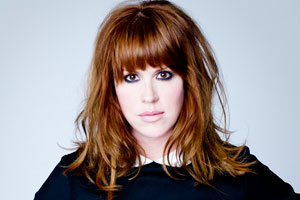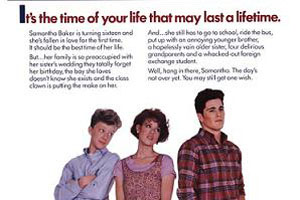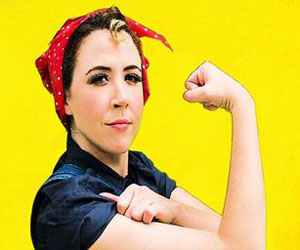
From teen heartthrob in the John Hughes movies of the ’80s to mother of a pregnant teen in the TV series The Secret Life of the American Teenager, actress Molly Ringwald has come full circle. The Pretty in Pink icon, a mother of three, has also authored her first book, Getting the Pretty Back (HarperCollins) due out April 27. It’s a splashy, servicey manual of confessions and advice for women approaching their 40s and trying to get comfortable in their own skin. Ringwald took time from her family and work schedules to tell Mother Jones about the book, her greatest film roles, the passing of her movie mentor, parenthood, and a tad of politics.
Mother Jones: 2010 marks the 25th anniversary of the release of The Breakfast Club. How do you think it holds up?
Molly Ringwald: Judging from the way people respond to it now, I think it holds up incredibly well. Much more than I ever imagined when we actually did it. I loved the script and I loved making it, but I never dreamed that it would have the sort of longevity that it has. I think a lot of the themes that are explored in the movie are really totally relevant today. And there’s never been a movie really like it at all, so there’s been nothing to sort of knock it down off its pedestal.
MJ: Does it upset people who meet you when they discover you’re not really Claire or Samantha or Andy?
MR: [laughs] No. I don’t really have that experience.
MJ: The critic Pauline Kael once said you brought “a charismatic normality” to the teen roles. How much of these characters did you feel you were contributing, and how much was actually getting teased out by people like [director] John Hughes and your onscreen colleagues?
MR: I think there was a lot of myself in the characters. I mean, they were different, and a lot of their life experience was obviously quite different, from my own personal experience, but a lot of my personality went into my parts. And they were also either sort of written for me or tailored for my strengths…The character of Claire [in The Breakfast Club] was the most different from me, because I never considered myself a popular kid, and I didn’t come from this wealthy family or anything, so at the time that was a real stretch for me.
MJ: You talked about playing to your strengths—what sorts of strengths and qualities stand out in those characters?
MR: I think I’ve always had a really expressive face. I don’t think I could ever be a really good poker player, because I think my face just expresses too much. Particularly when I was a teenager, I would think something, and it would automatically just show on my face. I think that really helped a lot for those characters.
MJ: How long did it take before you realized that these movies were, as you put it, “planted in the American consciousness?”
MR: After 10 years, when they were still around, I think it was pretty clear to me that there was something about them that wasn’t going to go away. And then after 20 years…well!
MJ: I believe there was talk of a Pretty in Pink sequel a while back?
MR: There was actually pretty serious talk about a Sixteen Candles sequel, but now that John’s gone I really doubt that’s going to happen.
MJ: On that, obviously John Hughes passed away last fall, and you eulogized him in the New York Times by quoting Allison in The Breakfast Club: “When you grow up, your heart dies.” Was that a message only for John, was that something that sums up your experience as well?
MR: No, it doesn’t sum up my experience. I think it was John that wrote that line, and I think it was something that he felt. I think it was one of the reasons that he connected with teenagers and the teenage experience so much. I don’t know how he felt later on, because as I say in the op-ed piece, we weren’t in contact. But I think it’s something that he felt at that time. And it was actually something that I didn’t even set out to write. I was writing the piece, and that line flashed into my mind when I was writing about the tragedy of him dying of a heart attack so young. And then it just seemed incredibly ironic to me that he would have written that line, and that he really did have a heavy heart. It was very hard for him to sort of move on and forgive and let things go. He held a lot in and was very easily wounded.
MJ: You also wrote that John “was my Truffaut”—tell us about the nightingale’s song, or the resonance, he gave you that you kind of took with you.
MR: When I was living in France, I was watching all the Antoine Doinel films that [director François] Truffaut did with Jean-Pierre Léaud, and they had this incredible connection together; they did one film after the other, and Jean Pierre Leo was in many ways Truffaut’s alter ego. And when I was watching the movies I thought, well, that was like John for me. And so that’s what I wrote to him, I wrote to him a lot about these movies I was watching and my feelings about that.
MJ: A lot of people’s minds might be blown on learning that their teen icon has geeked out to Shakespeare, to Jean-Luc Godard, to François Truffaut.
MR: [laughs] I’ve always been the bookish type, and I’ve never really hidden that about myself. Books have always been really important to me; they’re my saving grace. Whenever people ask me how I manage to get through this whole crazy time of being incredibly famous and sort of an icon and supposedly a role model and all of this insanity, I always cite my family and then books. I don’t know what I would have done without books.
MJ: What are some of the books that helped ground you?
MR: I remember reading Nine Stories on the school bus when we were doing the bus scene in Sixteen Candles. But I read Catcher in the Rye when I was 14 and I think that was really my entre, as it is for a lot of young people, into books. Before then, you’re sort of at school and you’re into these “young adult” kinds of books, and then all of a sudden here’s a real book. It’s about young people, but there’s that distinction between a young adult book and a real book. And I think once you sort of cross over and you realize what books can be—and if they mean something to you—there’s just no stopping you. So then I read everything by J.D. Salinger, and from there to Fitzgerald and then Hemingway, and then I moved onto the Russians, War and Peace…The wonderful thing about books is you never run out of them, you can just keep going. So I’m always finding new writers, or old writers that I just happen not to have read. As much as I’ve read, there’s always huge black holes of writers I’ve never read.
MJ: Let’s talk a little bit about your first foray into book writing. It’s sort of an eclectic mix of makeup and style tips, recipes, and occasionally some difficult childhood memories. How challenging was it for you to tackle Pucci scarves and your family’s financial struggles all in one tome?
MR: It’s not easy. Although I’ve written a lot of essays and short stories and little things here and there, I’d never actually sat down and written a whole book, and it was incredibly challenging, mostly because you feel like it’s never going to happen, you’re never going to get to the finish line. Certain parts of the book were really easy to write—I kind of had a vision for the certain kind of book I wanted to write, which was basically the kind of book I wanted to read at the time. The idea came about when I was turning 40 years old and I felt like, How is this possible? How is it possible I’m turning 40? Other people can turn 40, but not me! Then I looked around and thought, you know, there was really no book that I wanted to read that was a celebration of being an “it” woman rather than an “it” girl. So that was the genesis. I wanted it to be a really pretty, fun book; I did not want it to be a straight memoir, because I thought I’m too young to write a memoir. So I wanted it to be this illustrated, really beautiful, fun, sexy little book and something that doesn’t have to be read in a linear fashion. So I sat down and I started writing. It took me longer than I thought it was going to take me, because I ended up getting pregnant with twins, and that kind of slowed me down a little. But, yeah, I’m incredibly proud of it.
MJ: Did you feel more like yourself when you were sitting down writing the book? Or did you feel yourself sliding into “actor” mode?
MR: I feel more like myself. I’ve been acting for so long it’s more like—I won’t say easy, exactly, but there’s not the same angst with writing that comes about with acting. Writing—particularly when you’re writing yourself, when it’s you, when it’s your life, you really can’t hide.
MJ: Your husband is a writer and editor of books. Did that make writing your book easier or harder?
MR: I think it definitely made it easier, because he is the only person that I show my writing to as I’m going along. I would write a chapter or a big chunk of a chapter and then send it to him; he’s my first editor and cheerleader. And I respect his writing and opinion so much that when he would say “This is really fantastic,” or “This is really great,” it helped me keep going. Although it can be a little intimidating, because he is a really great writer. I make a point of not reading his writing while I’m writing.
MJ: I understand that you guys actually met over a passage by the writer John Cheever. How did that work?
MR: I write about it in the book. He posted it on this online group that we were a part of called Quid Pro Quo; I had never read Cheever before and I found that particular paragraph really stunning. So I wrote to him and I told him that, and he wrote back to me and said that he liked the Stephin Merritt I posted earlier that week…and that started an email correspondence that went on for a while.
MJ: Before this project, you had written literary reviews and done some interviews of other artists. Do you expect to do more writing after this book is out, or are you taking a break for a while?
MR: I’m taking a break, but I did sign a two-book deal, [laughs] so yeah, I do plan to write another book. But this one was a lot of work. There was the whole writing process, but then there was the design element to the book. So I am going to take a break. But I am working on my website, which is going to be a sort of blog. I’ve definitely gotten a lot more into writing, I wouldn’t say full-time, but a lot more than I have in recent years.
MJ: In your book, you also tell a funny story about recently running into Emilio Estevez. Do you keep in touch with any of the other Brat Pack actors nowadays?
MR: We don’t really see each other very often. Usually it’s at some awards show or some tribute to those movies or to John Hughes. I did see Michael [actor Anthony Michael Hall] around the time when John passed away, so I would say I talk to him more than I do the other actors. I haven’t seen Emilio…that might have been the last time I saw him actually.
MJ: You and the other Brat Pack stars became synonymous with the 80s soundtracks of those movies, songs by bands like Psychedelic Furs, New Order. But you write in your book that as a kid, you were listening to and performing jazz.
MR: I started out as a singer and thought that was where my main focus would be, because my dad is a musician. And it’s really the only thing I listened to exclusively as a kid. But then as I became a teenager, I started listening to contemporary music more. I’m still very eclectic and I absolutely love both. Jazz is my comfort music, like comfort food, but I really love the Magnetic Fields—I just saw them. I like Rufus Wainright, and Camera Obscura, and of course I love Psychedelic Furs, and that song “Pretty in Pink,” which is kind of how I got the movie written about me.
MJ: Any other particular albums that you’re listening to lately that stick out in your mind?
MR: I’m listening to Magnetic Fields a lot because I just saw them. I’m a big fan of theirs. I like Lisa Hannigan, who sang with Damien Rice, and I like Adele, and I like the French singer Benjamin Biolay and I love Karen Ann, she’s one of my favorite favorites. I think she’s really really brilliant.
MJ: You were once interviewed by Katie Holmes, you’ve acted with Jason Biggs on stage, and now, in The Secret Life of the American Teenager, you’re playing a mom to a precocious and pregnant teen. Do you feel some special affinity with teen stars today? Do you relate to them in a particular way?
MR: I don’t think that I relate to them any more than anyone else does. Maybe the only difference with me than with other adults is that they relate to me a little bit more, because those movies that I did were so well-known and they’re such touchstones for all teenagers. But in terms of what’s going on with teenagers today, I don’t think that I know any more than what another person might. Also, because I’m the mother of a six-year-old and eight-month-old twins, I’m kind of in a different phase of my life. The teen stuff isn’t quite on my radar.
MJ: I understand you have a philosophy about TV in the house with kids.
MR: For years, we didn’t have a television. The first few years Mathilda was alive, we didn’t have a TV, and then we finally broke down and got one. But not having had a television for that early time, she is not interested by television at all. She just doesn’t like to sit down and watch TV; she’s much more interested in other stuff, which I’m kind of pleased about. I don’t really know if it’s cause and effect, if it’s because we didn’t have a TV or if it’s just Mathilda, but she’s not really very interested.
MJ: Speaking of your work as a TV mom, this summer Bristol Palin, the daughter of Sarah Palin and a new mom herself, is going to play herself in an episode of Secret Life of the American Teenager. What are your thoughts on that? And speaking as a mother, do you have any advice that you would give her?
MR: I think that she’s somebody who made a mistake and has acknowledged that she made a mistake. I don’t share the same politics as her mother. We have very, very different political views, and I don’t believe that Bristol’s message is really one that’s terribly realistic. It’s fine that she can say that she made a mistake. But to preach abstinence, I think, is absolutely not the right message to give to kids. So I don’t agree with that. I think it’s communication and talking about choice. It’s something that I’m definitely going to do when it gets to the point where my daughter is thinking about sex. We need to have an open dialogue about it, and she needs to know how to protect herself. I just think that it’s completely unrealistic to think that kids are not going to have sex.
MJ: You write in the book that “beautiful underwear is the ultimate morale booster, it’s like walking around with a wonderful secret.” And that got some of our editors thinking: Does that mean that, given another chance, does that mean that you wouldn’t have given your panties to that geek?
MR: [laughs] Well! That was a character. I have never actually given my panties to a geek.















